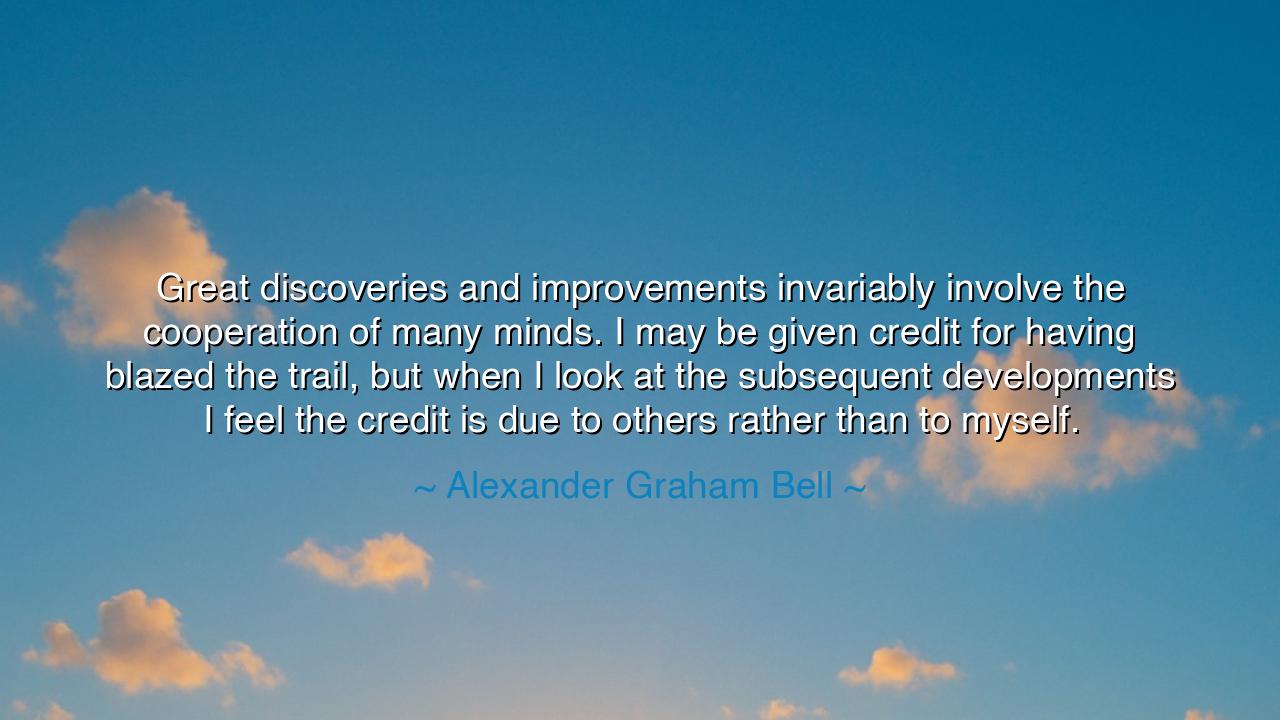
Great discoveries and improvements invariably involve the
Great discoveries and improvements invariably involve the cooperation of many minds. I may be given credit for having blazed the trail, but when I look at the subsequent developments I feel the credit is due to others rather than to myself.






“Great discoveries and improvements invariably involve the cooperation of many minds. I may be given credit for having blazed the trail, but when I look at the subsequent developments I feel the credit is due to others rather than to myself.” — thus spoke Alexander Graham Bell, the inventor whose voice first traveled along invisible wires, binding the world in a network of sound. In this statement, uttered with humility and truth, Bell reveals the ancient wisdom that no great achievement belongs to one man alone. For every discovery that changes the world is not born from solitude, but from the shared light of many minds, each contributing a spark to the flame of progress.
The origin of this quote lies in the twilight years of Bell’s life, when his own invention — the telephone — had already transformed humanity. The world hailed him as a genius, a solitary pioneer who brought the future into being. Yet Bell, in his wisdom, saw beyond the illusion of solitary greatness. He recognized that invention is not the work of a single mind, but a continuum of human thought, stretching backward into those who inspired him, and forward into those who refined and expanded upon his creation. In this humility, Bell echoed the eternal truth that all human advancement is a collective inheritance.
From the earliest ages, the great thinkers have understood that the pursuit of knowledge is a chain of generations — each link forged by countless hands. Isaac Newton, centuries before Bell, confessed the same humility when he wrote, “If I have seen further, it is by standing on the shoulders of giants.” Newton’s law of gravity, his calculus, his optics — all arose from the ideas, failures, and efforts of those who came before. Even the most luminous mind does not shine alone; it reflects the light of others. Bell’s acknowledgment of this truth is not self-denial, but reverence — a recognition that human progress is a symphony, not a solo.
To “blaze the trail” — as Bell says — is a noble act, but the trail itself is worthless unless others follow it, widen it, and make it into a road that serves all humankind. The history of invention is filled with such shared triumphs. Consider the story of Thomas Edison and the electric light. Edison perfected the bulb, but his work rested upon the discoveries of Humphry Davy, Warren de la Rue, and Joseph Swan. It was the cooperation of many minds, not the brilliance of one, that finally brought light to the world’s darkness. The same is true of the printing press, of flight, of medicine, of every art and science — the single name that history remembers is only the crest of a vast, unseen wave.
Bell’s words also teach a deeper moral truth — that humility is the guardian of wisdom. The proud mind closes itself off, believing it has reached the summit of knowledge; the humble mind remains open, forever learning, forever listening to others. Bell’s greatness was not merely in inventing the telephone, but in seeing himself as part of something greater than himself — a human chorus of discovery. He understood that ideas are living things, carried from one mind to another, transformed and perfected by cooperation. Where there is collaboration, there is creation; where there is isolation, there is only stagnation.
History’s greatest civilizations were built upon this same principle. In ancient Alexandria, scholars from every land gathered to share knowledge — mathematicians from Greece, physicians from Egypt, astronomers from Persia, all working side by side. It was not one nation or one genius that advanced the sciences there, but the union of many minds devoted to truth. So it has always been: when humanity works together in curiosity rather than competition, it ascends; when it seeks glory for itself alone, it collapses under the weight of pride.
Thus, let this teaching of Alexander Graham Bell be engraved upon the hearts of all who seek to create, invent, or lead: honor those who walk with you. Share your knowledge freely. Seek counsel, and give it. Do not crave the illusion of solitary glory, for it fades quickly; instead, seek to contribute your part to the eternal structure of human progress. The hand that builds alongside others builds something that endures.
For in truth, no discovery belongs to one; it belongs to all. The river of wisdom flows through every age, gathering strength from each soul it touches. We are not owners of our ideas, but stewards of a greater inheritance — the light of the human spirit, kept alive by the cooperation of many minds.






AAdministratorAdministrator
Welcome, honored guests. Please leave a comment, we will respond soon